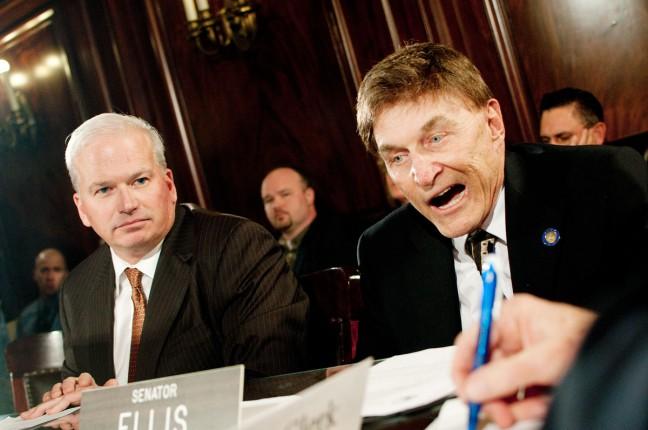In a move that shocked opponents and threw the Capitol into chaos, Senate Republicans pushed through a stripped-down version of the governor’s contentious budget repair bill Wednesday in an 18-1 vote.
With the entire Senate Democratic caucus outside of Wisconsin, the Senate has been unable to meet quorum to pass the bill. That all changed Wednesday night when Republicans stripped fiscal components from the bill, dropping the quorum requirement.
Legislative leaders held a joint conference committee meeting in the Senate parlor at 6 p.m. to discuss discrepancies between the Senate and Assembly versions of Gov. Scott Walker’s budget repair bill, which he introduced nearly four weeks ago on Feb. 11.
The lawmakers at committee adopted an amendment that left provisions repealing collective bargaining and prohibiting state employee strikes intact while stripping the budget repair bill of its fiscal items. By doing so, Republicans could take up and pass the bill without any Democrats returning.
“I have consulted with the Legislative Council Bureau, Legislative Reference Bureau and Legislative Fiscal Bureau and have been advised this proposal would not trigger the special quorum requirement in article 8, section 8 of the Wisconsin constitution,” Senate Majority Leader Scott Fitzgerald, R-Juneau, said to his colleagues in committee.
Sitting on either side of Scott Fitzgerald were Reps. Assembly Speaker Jeff Fitzgerald, R-Horicon, Scott Suder, R-Abbotsford and Senate President Mike Ellis, R-Neenah.
The lone Democrat, Rep. Peter Barca, Kenosha, sat across the table from an empty chair with a name plate belonging to the leader of the missing 14, Sen. Mark Miller, D-Monona. The director of the non-partisan Legislative Fiscal Bureau sat at the head of the table and served as the committee’s clerk.
Scott Fitzgerald was the first to address the committee.
“In order to move this process forward, the speaker and I have asked [Legislative Fiscal Bureau Director Robert Lang] to prepare a proposal for the committee’s consideration,” Fitzgerald said, reading from a statement. “The proposal in front of you, if the committee approves it, will be drafted as a substitute amendment to special session assembly bill 11.”
He then started a motion to adopt the amendment, but Barca interrupted and asked to speak.
Only after a man sitting with the 20 or so members of the public who were let in shouted aloud, “Take a moment! Take a moment! Step back from the abyss! Think about what you’re doing here!” did Scott Fitzgerald recognize Barca.
Barca said he questioned the legality of holding a meeting without notifying participants and the public at least 24 hours in advance. Officials announced the meeting through e-mail at 4:09 p.m., Barca said.
Public notice of every government meeting must be given 24 hours in advance. A shorter notice can be given if there is “good cause,” but even then no notification can be provided less than two hours in advance of the meeting, according to open meetings law.
Scott Fitzgerald stopped Barca while he was in the middle of discussing the open meetings law, at which point Fitzgerald told Lang to begin a roll call vote on the amendment.
Over Barca’s protests, the four Republicans present voted in the affirmative, adopted the amendment and moved to adjourn the meeting. While a stunned Barca addressed the press still in the parlor, Republicans were moving onto the chamber floor to begin a Senate session.
With the fiscal components stripped from the budget repair bill, the Republican Senate passed the bill quickly, with 18 senators voting affirmative while one Republican, Sen. Dale Schultz, R-Richland Center, voted no.
“As someone who has spent the better part of the last four weeks working toward and hoping for a compromise, this is a difficult night,” Schultz said in a statement. “Ultimately, I voted my conscience, which I feel reflects the core beliefs of the majority of voters who sent me here to represent them.”
Schultz had drafted an amendment to the budget repair bill that would have made the provisions ending collective bargaining for state employees sunset after two years. He withdrew his amendment in a previous Senate session because he said his amendment could not move forward without the Democrats.
Barca, standing in front of a dozen other Democrats, said it was an extremely sad day for Wisconsin.
“Clearly the people of Wisconsin were cheated tonight. They cheated democracy. They cheated workers,” Barca said. “They cheated what this state was built on.”
Walker applauded the Senate in a statement Wednesday night.
“In order to move the state forward, I applaud the Legislature’s action today to stand up to the status quo and take a step in the right direction to balance the budget and reform government,” he said. “The action today will help ensure Wisconsin has a business climate that allows the private sector to create 250,000 new jobs.”
The Assembly is scheduled to hear the amended budget repair bill Thursday morning.
– –
In the March 10 article, “The lawmakers at committee adopted an amendment that left provisions repealing collective bargaining and prohibiting state employee strikes intact while stripping the budget repair bill of its fiscal items, such as pensions and health care premium contributions,” it should not have said pensions and health care contributions were items removed from the bill. Instead, they were not removed from the amended bill that passed through the Legislature. Also, “Step back from the desk!” it should have said “Step back from the abyss!” not “…desk!” We regret the errors.













